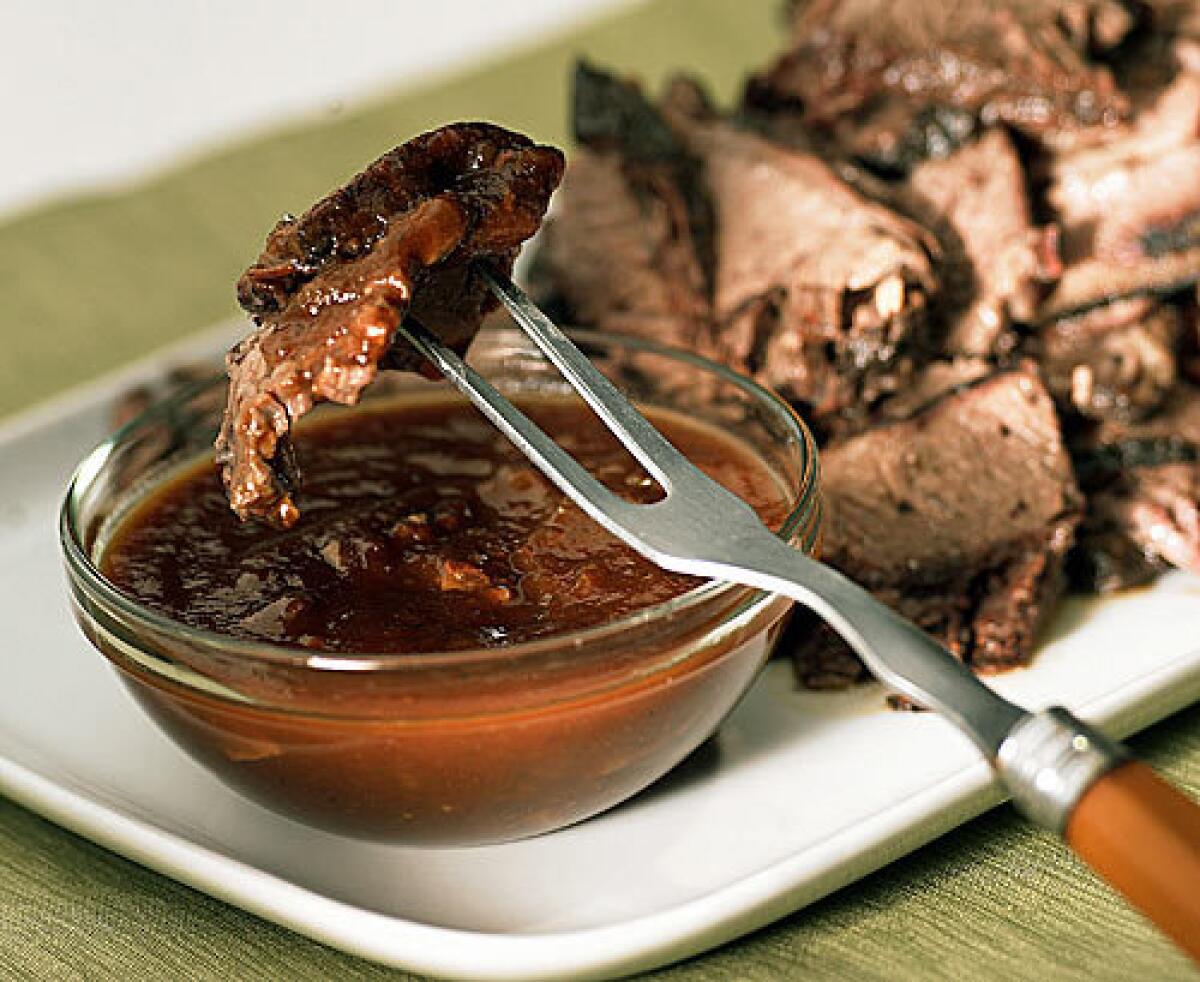A barbecue master’s signature sauce

If you love outdoor cooking, there’s nothing like taming a tough cut of meat through the mastery of a low and slow fire, or deftly handling a lean cut quickly over a hot grill. But often it’s that signature touch -- a thoughtfully honed sauce -- that separates barbecue masters from weekend warriors.
At once sweet, sour and spicy, the best sauces achieve a controlled balance of what might initially seem like contradictory flavors. These aren’t run-of-the-mill sauces, mass-produced and available at any market. These sauces are special, and you tailor them to fit whatever you’re cooking at the time.
Start with a foundation. Most traditional barbecue sauces are tomato-based, drawing on tomato sauce, fresh or canned tomatoes, ketchup or a combination of these. There are also vinegar-, mustard-, broth- and even mayonnaise-based barbecue sauces.
From there, add ingredients one or two at a time and taste carefully; you’re looking for balance. Sweeten the sauce with sugar, or other options such as maple syrup, brown sugar or even molasses. (Because sugar burns easily, most barbecue sauces should be applied at the last minute to avoid scorching.)
Give the sauce a tart note with any of a variety of vinegars, or try citrus juice or zest. Consider fresh or ground spices and herbs, and adjust the heat with fresh or dried peppers or hot sauce. Then season the sauce; add a little salt, or deepen the flavor with soy or Worcestershire sauce.
Allow the mixture to cook slowly to give the ingredients time to mature and marry, much as you would with a homemade tomato sauce or chili. Like the best barbecue, a great sauce develops slowly, its flavor improving with time.
Finally, consider taking the sauce to the next level by adding one or more signature ingredients. Think fruit juice, coffee or cola, chiles, agave nectar, horseradish or an unusual spice.
Liquid smoke may be controversial in some circles for health reasons, but it can lend depth to a sauce, particularly when the meat is not smoked or grilled over an open flame but cooked on a stove-top grill or slow-cooked in an oven.
One fun route is using liquor. For a Kentucky bourbon barbecue sauce, simmer some onion and garlic in a couple of cups of bourbon. A slow simmer will soften the onion and garlic, and the bourbon will mellow to buttery richness as the alcohol cooks off.
The foundation of this sauce is ketchup and tomato paste. Sweeten it with brown sugar and molasses, then balance that by adding cider vinegar, pineapple and lemon juice (pineapple and lemon juice are natural complements to bourbon). Add depth with Worcestershire sauce, salt, liquid smoke and dry mustard, then spice it just a bit with a little hot sauce and chile powder.
Slightly sweet, the sauce is perfect mopped over pecan-crusted pork spareribs. Coat the ribs with a seasoned wet rub of Dijon mustard, brown sugar and chopped pecans, then cover and bake them over low heat for two to three hours until they’re meltingly tender. Shortly before they’re done, uncover them and baste them with the barbecue sauce; the sauce will thicken to a beautiful shellac. Serve the ribs hot, with a stack of napkins.
Or go a different route. Fruit is an increasingly popular ingredient in barbecue sauces, but it must be used with discretion. You don’t want barbecue sauce to taste like jam. Roast fresh whole cherries in a little almond oil. (Almonds heighten the flavor of the cherries.)
While the cherries are roasting, sauté some onion with garlic and orange zest in a heavy pot until translucent, then stir in some fennel, chipotle and cumin powder to balance the sweetness.
Purée the sauce, then add some whole cherries to give the final sauce added texture. The finished sauce is rich with flavor, not too sweet and perfect for stuffed pork chops or chicken.
Barbecue often revolves around pork, but in Texas, beef brisket shares the spotlight. For this, you want a sauce that’s a little more acidic to balance the richness of the beef and the power of the hickory smoke.
This is a ketchup-based sauce, but it gets its personality from peppers cooked down with beer and super-strong coffee. It is rich with a gentle kick, not sweet, and tart enough to stand up to the complex flavors of a hickory-smoked brisket.
Finding your own sauce is a matter of balancing flavors and careful cooking. Trust your taste and don’t be afraid to experiment. Barbecue sauces have a mystique about them, but developing your own signature style isn’t rocket science.
More to Read
Eat your way across L.A.
Get our weekly Tasting Notes newsletter for reviews, news and more.
You may occasionally receive promotional content from the Los Angeles Times.











